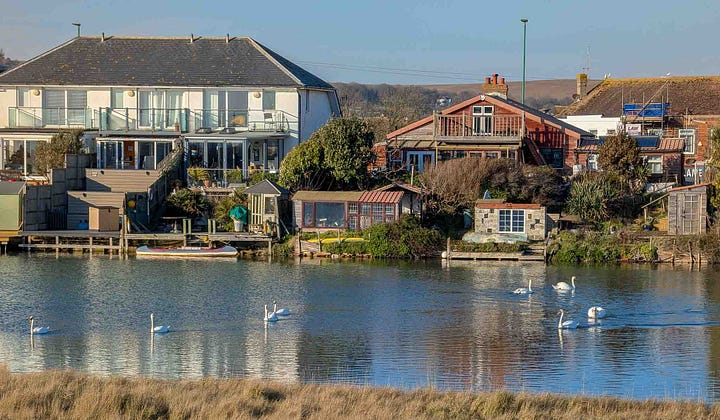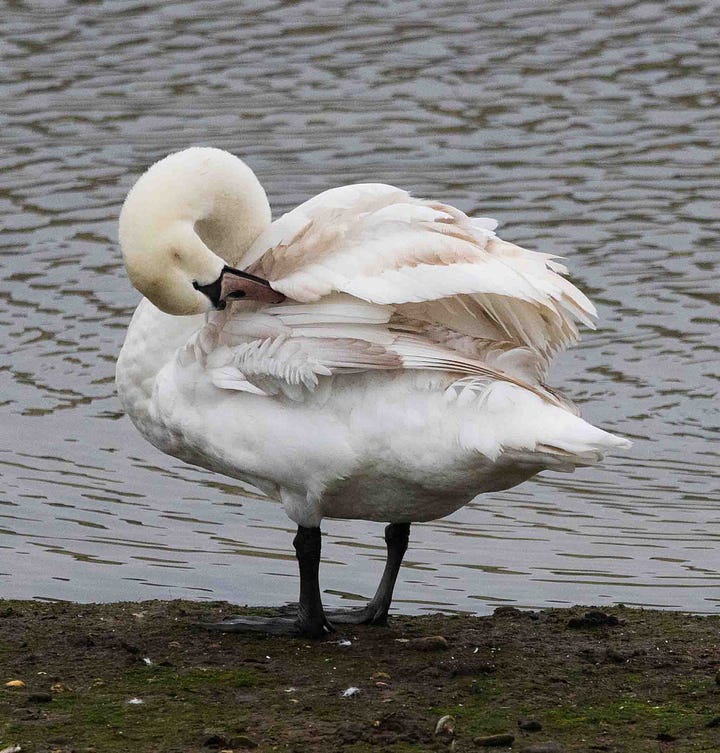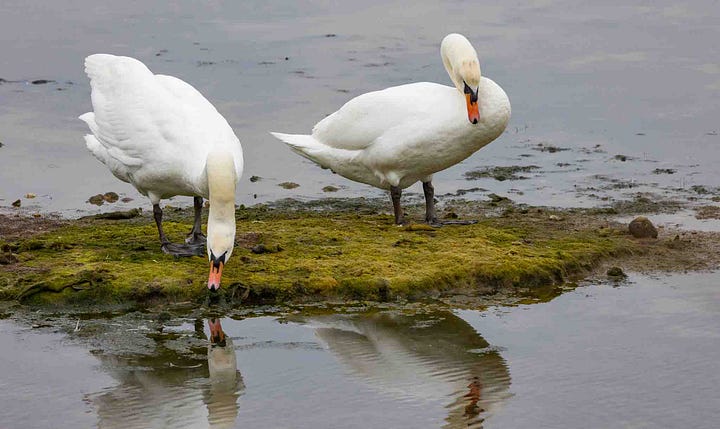Navigating Chaos: Finding Purpose When the World's Gone Mad
Property developers, tech bros, and the women actually solving problems: a morning's reflection
Hello, Denyse here, and a very warm welcome to We Are Mimosa, a place for women building brands which are aligned with their purpose and values, and who care about making the world a better place.
This morning, in what I can only describe as a moment of masochistic curiosity, I decided to check The Guardian's website. Usually, I'm more sensible - there's something to be said for maintaining one's sanity by selectively managing the day’s news consumption. But there I was, coffee in hand, about to discover that Donald Trump has developed "concepts of a plan" to "take over" and "own" the Gaza Strip.
Yes, you read that correctly. The man who couldn't quite manage healthcare reform now apparently wants to Make Gaza Great Again and turn the territory into the new Riviera of the Middle East. Because according to Trump, Gaza has been "an unlucky place" for a long time. (One imagines this ranks rather high on the understatement scale, somewhere between "British weather can be damp" and "Heathrow's third runway might face some planning challenges.")
But wait, there's more. While scrolling past Trump's musings about turning a humanitarian crisis into a real estate opportunity, I discovered that Elon Musk had been busy too. His "Department of Government Efficiency" (Doge) - and yes, that's really what he's calling it - spent the weekend attempting to gain "unfettered access" to major US government agencies' computer systems. When the dust settled, several top officials who opposed this takeover had been pushed out.
At this point, I seriously considered returning to my usual morning routine of checking on how many of my sweet pea seeds have sprouted. They, at least, respond to chaos with reliable grace, climbing steadily upward regardless of what the world's billionaires are plotting. And gardening - I’ve concluded - is the new resistance.
Beyond the Noise: What Thoughtful People Do When the World's Gone Mad
Instead, I found myself diving into what other thoughtful people were making of all this. What I discovered - through Stephanie Pollock's January reflections, Shannon Watts' manifesto for a better future, and Ezra Klein's careful unpacking of Trump's tactics - was something rather fascinating about how different minds process similar madness.
What struck me, as I swapped my Guardian-induced despair for more reflective reading, was how differently each of these writers were processing essentially the same chaos. Stephanie Pollock, writing from Canada (where Trump has helpfully announced he'll slap 25% tariffs on everything - because apparently being America's longest peaceful neighbour isn't worth what it used to be), found herself contemplating Mary Oliver's poetry and the persistent question of what to do with one's "one wild and precious life" when Trump is intent on flooding your zone with fetid distractions.
Shannon Watts, meanwhile, was busy imagining something rather brilliant: a "womansphere" to counter the toxic masculinity that seems to be having rather too much fun lately. Which, when you think about it, is a rather perfect response to both Trump's property developer approach to international crises and Musk's "I'll just take over the government's computers" strategy. While the boys are busy playing monopoly with global institutions, women are quietly building actual solutions to real problems.
This thought led me, during my walk along Widewater Lagoon (where, thankfully, no billionaires have yet announced plans to "take over and develop" the shoreline), to The Two Percent podcast featuring Wendy Tsu of Branch Care. Now here was something genuinely refreshing - a founder who saw America's broken fertility care system and thought, "Right then, I'll fix that" instead of, say, announcing "concepts of a plan" for healthcare reform.
What fascinated me most, as I dodged the morning joggers (who always seem alarmingly purposeful compared to my contemplative meandering), was how these different voices pointed toward something important about navigating our current chaos. While Klein was methodically unpacking Trump's "flood the zone" strategy, and Watts was imagining better alternatives to toxic masculinity, and Pollock was finding solace in poetry and purpose, they were all, in their own ways, grappling with the same fundamental questions:
How do we maintain agency in a world that seems increasingly untethered from reason?
What role do our values play when reality TV has invaded global politics?
And perhaps most intriguingly, how do we distinguish between destructive chaos and constructive disruption?
A Different Kind of Disruption
Speaking of mavericks quietly revolutionising things while others make headlines about their redevelopment plans for the Middle East, there's something rather poetic about how Kate Ryder and Wendy Tsu represent a different kind of disruption. While I walked along Widewater Lagoon (where, I should mention, 40 swans demonstrate daily how to live one's best life without needing to announce it - in CAPITAL LETTERS - on Truth Social), I found myself reflecting on the stark contrast between their approach and what we might call the "loud boys" school of changing the world.
You see, when Ryder first pitched Maven Clinic to venture capitalists, she was told women's health was a "niche problem." (One imagines these were the same sort of people who once thought the internet was just a passing fad.) Rather than storming government computers or finding somebody wholly unsuited to oversee healthcare, she simply got on with building something that actually works. The result? A fast growing company valued at $1.7 billion that's genuinely transforming healthcare for millions of women.
Now Tsu is following a similar path, recognising Ryder as a fellow maverick who understood that sometimes the most revolutionary act is simply solving real problems while others are busy generating headlines. There's something wonderfully satisfying about how these women are disrupting massive industries not through hostile takeovers or grandiose announcements, but through the radical act of building things that actually help people.
It's rather like those swans on Widewater Lagoon (I promise this metaphor is going somewhere). They create their own sense of order amidst the chaos, neither bothered by the morning's headlines nor feeling the need to announce "concepts of plans" for lagoon improvement. They simply get on with the business of being swans, which, when you think about it, is rather more impressive than most billionaires' schemes for world domination.
This brings us to something rather important about navigating our current moment of global chaos. While the world seems increasingly divided between those creating chaos and those paralysed by it, there's a third way emerging. It's being pioneered by women who understand that true disruption - the kind that actually makes things better rather than just louder - requires something more sophisticated than midnight tweets or hostile takeovers.
On Maintaining Our Equilibrium
This "spa for the soul" concept rather perfectly captures something I've been noticing in how different people maintain their equilibrium while the world seems intent on testing our collective blood pressure. Take Stephanie Pollock, who turns to Mary Oliver's poetry when the news becomes too much. There's something rather wonderful about how Oliver's "I Go Down to the Shore" serves as an antidote to Trump's "I Go Down to Gaza with a Property Development Plan."
The sea, in Oliver's poem, simply says "excuse me, I have work to do" - which, when you think about it, is a rather perfect response to most of what's happening in our news feeds. While I watched those swans on Widewater Lagoon this morning (who, I should note, have mastered this approach without ever reading a word of poetry), I realised that's exactly what women like Ryder and Tsu are doing. They're essentially saying, "Excuse me, I have actual healthcare problems to solve" while others are busy announcing concepts of plans.
This isn't about ignoring the world's chaos - rather, it's about finding what I'm starting to think of as "strategic sanity." It's the difference between Musk's dramatic government agency takeover attempts and how femtech founders are quietly revolutionising healthcare. One generates headlines; the other generates solutions. One floods the zone with noise; the other creates protected spaces where actual transformation can happen.
When Sweet Peas Make More Sense Than Headlines: Finding Purpose in the Age of Chaos
Which brings us to something rather crucial about navigating our current moment. While it's tempting to either withdraw completely (my sweet peas are looking particularly appealing right now) or get caught up in the daily outrage cycle, there's a more sophisticated approach emerging. It combines what you might call "constructive disruption" with what those swans demonstrate daily - the ability to create one's own sense of order while the world spins increasingly off its axis.
This is where agency, values, and what I call "contained transformation" come together in rather interesting ways. But that's a deeper conversation for another day (or several days, really - these aren't exactly topics you can cover between checking Trump's latest posturing and Musk's newest takeover attempts).
For now, I'll leave you with this thought. Perhaps the most revolutionary act in our current chaos isn't generating the loudest headlines or even fighting every fire as it starts. Perhaps it's creating those protected spaces - those spas for the soul, if you will - where meaningful work can happen, where real solutions can be built, and where we can maintain enough strategic sanity to actually make things better rather than just louder.
Looking Ahead
Next week, we'll dive deeper into how agency plays a crucial role in this approach. But for today, I'm taking a cue from those Widewater swans and focusing on the work at hand. After all, like the sea in Oliver's poem, we all have work to do - preferably something more substantial than flooding the zone instead of solving the world's problems.
Meanwhile I’ll leave you with photos of Widewater Lagoon's swans living their best lives, providing a moment of spa for the soul.




If this resonates with you, please take a moment to "❤️" and share this post. Your perspective matters, and sharing it helps build the supportive community we all need.
Until next time,
Denyse
About Women's Leadership and Systemic Change: Research shows that when women understand challenges as systemic rather than personal, they make different choices about their capabilities and potential. This "attribution shift," studied by organizational behavior researchers, enables both individual transformation and collective change.
About Me
If you’re new to my work, it might be helpful if I explain who I am and what I do!
I’m Denyse Whillier, a former Chief Executive with more than 25 years of business experience under my favourite Sézane belt. I upcycle my skills and experience to provide business mentoring and strategic support, reimagined for female founded businesses.
My mission is simple. It’s to make it easier for women to build thriving brands which are aligned with their purpose and values and to close the gender gap in entrepreneurship, one female founder at a time.
To find out how I can support you on your business journey, check out this link. And if you’d like to know more about the results my clients get, here are some of my case studies.
One-off advice | 3-hour intensive | Ongoing monthly business coaching | Done-for-you business audit

